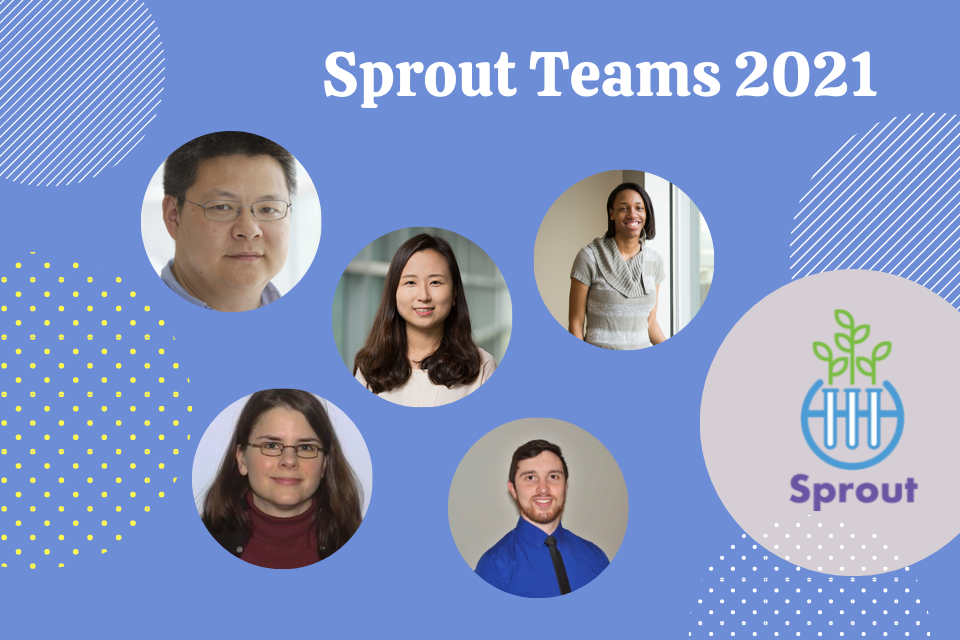Sprout 2021 Winners Are Transforming Industries

The Brandeis University Innovation Center’s Sprout program, one of the university’s longest-running programs to support innovation in the sciences, has just announced the recipients of their 2021 Sprout Grant recipients. The grants are designed to accelerate the commercialization of technologies born in the labs of Brandeis that show strong potential for commercialization. Funded 50% by the Office of Technology Licensing and 50% by the Provost’s Office, the program is now in its tenth year. Spanning materials science, nanotechnology, and medical breakthroughs, the Sprout program this year will support some of the university’s most creative scientists.
The discoveries awarded Sprout grants this year are:
Molecular Nanotechnology Eliminating Undifferentiated Human Induced Pluripotent Stem Cells (iPSCs) for Cell Therapy Nanotechnology
From the lab of Bing Xu, team: Shuang Liu and Adrianna Shy
Induced Pluripotent Stem Cells (iPSCs) can be formed into other cell types, having enormous potential for cell therapy, but the risk of tumor formation from undifferentiated cells (cells that stay the same) remains a major obstacle. This project is developing a molecular nanotechnology to eliminate undifferentiated iPSCs selectively by enzyme-instructed self-assembly (EISA). This can contribute to ensuring the safety of cell therapy, thus improving the treatment of human diseases.
Development of Solar Heat Collector Modules for Long-Term and Controlled Energy Storage for Building Applications
From the lab of Grace Han; team: Mihael Gerkman and Qianfeng Qiu
This solar thermal energy storage device provides an efficient alternative to current technologies. With energy generation only possible during daylight hours, solar energy requires energy storage systems. Using phase change materials (PCMs) that are capable of controllably storing solar energy and releasing it in the form of heat through their chemical and physical changes, this system can store solar energy reliably and provide a carbon-free hot water solution for the entire day.
Sema4D: Rapid Assembly of Inhibitory Synapses in the Brain as a Novel Treatment for Epilepsy
From the lab of Suzanne Paradis, team: Vernon Clarke
Sema4D represents a new and exciting disease-modifying therapeutic strategy that offers hope to afflicted individuals and their families for the treatment of intractable seizures. Brandeis research has demonstrated that Sema4D causes formation of new inhibitory connections between neurons on a time scale fast enough to reduce ongoing seizure activity in animal models. The proposed work plans to investigate various modalities through which Sema4D can be introduced in the brain.
Optical Control of Organic Catalysts for Industrial Applications
From the lab of Grace Han, team: Alejandra Gonzalez and Joshua Wan
Catalysts find importance in both industry and academic settings, especially in research and development sectors. Homogeneous catalysts exhibit a high selectivity, being suitable for sophisticated synthesis, however their separation and recovery are extremely difficult, costly, toxic in process and time-consuming. Therefore, there exists a critical need to develop a cost-effective and green method for catalyst recovering and recycling. This project proposes to develop a novel light-responsive catalyst technology to address the need..
This year’s Sprout teams represent the resilience of Brandeis University’s scientific community during the pandemic. “Our Sprout teams found the way to continue their research both remotely and safely in their labs, following Brandeis, state, and national guidelines,” notes Rebecca Menapace, Associate Provost for Innovation and Executive Director of the Office of Technology Licensing, which runs the program. “It’s always impressive to see our researchers’ work, but especially so this year.”
“Sprout is really a great program not only for me, but especially for students. It opens students' minds to see the real world need for an invention. Brandeis Innovation encourages Sprout applicants to go through Brandeis I-Corps site program which uses experiential learning of customer and industry discovery, coupled with first-hand investigation of industrial processes, to quickly assess the translational potential of inventions. It also helps them to have new experiences, such as visiting Venture Cafe [LINK] and building new connections.”
As Sprout is poised to enter its second decade of building bridges between Brandeis labs and industry, this year’s winners show us that innovation here remains as interdisciplinary and engaged with the world as ever.